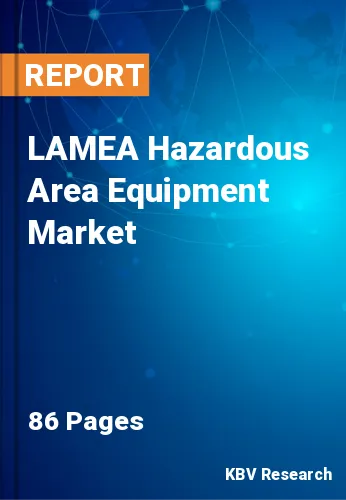The Latin America, Middle East and Africa Hazardous Area Equipment Market would witness market growth of 8.3% CAGR during the forecast period (2022-2028).
There are combustibility and explosibility tests for flammable powders and fibres that may be used to determine if the material being processed is capable of igniting as a layer or cloud of dust. Testing for particle conductivity and resistivity may be done to determine if processed powders have the potential to "short out" electrical equipment and circuits. Whenever the powder comes in contact with a hot surface, whether as a dust cloud or as a coating that settles on the hot equipment, there are essential characteristics to evaluate.
The dust cloud auto-ignition temperature (MIT-cloud) and dust layer ignition temperature (LIT) tests are two common laboratory procedures. They serve as a benchmark against the temperature rating (T value) listed on electrical equipment intended for usage in hazardous environments. Electrical equipment may be constructed to be either "intrinsically safe" or "explosion proof," according to two different design concepts, making it appropriate for usage in dangerous environments.
Electrical equipment that is intrinsically safe will have its energy output restricted such that it cannot, under any circumstances, ignite a certain hazardous environment. In actuality, this entails using little power and making sure that any energy held within is minimal. Equipment that is explosion-proof (or flame-proof) is robust and contained in some manner such that, even in the event of an explosion within the equipment, it won't ignite any nearby dangerous environment. Instrument and equipment makers employ a variety of techniques to guarantee that their products are flame/explosion resistant.
Safety equipment is required because of the constantly increasing demand for crude oil in order to avoid any fatalities at potentially dangerous refinery sites. The most reliable and affordable pipe connection systems are Freudenberg Oil & Gas Technologies' Vector Techlok clamp connectors, which can withstand large bending moments and axial forces under pressure without spilling to prevent dangerous fatalities or bolts coming loose, which greatly lowers maintenance costs and serious fatal incidents. These elements are fueling LAMEA's market for hazardous area equipment.
The Brazil market dominated the LAMEA Hazardous Area Equipment Market by Country in 2021; thereby, achieving a market value of $280.9 million by 2028. The Argentina market is showcasing a CAGR of 8.9% during (2022 - 2028). Additionally, The UAE market would register a CAGR of 8% during (2022 - 2028).
Based on Product, the market is segmented into Cable Glands & Accessories, Measurement Devices, Control Products, Lighting Product, Alarm Systems, and Motors. Based on Industry, the market is segmented into Oil & Gas, Food & Beverages, Chemical & Pharmaceuticals, Energy & Power, Mining, and Others. Based on countries, the market is segmented into Brazil, Argentina, UAE, Saudi Arabia, South Africa, Nigeria, and Rest of LAMEA.
Free Valuable Insights: The Global Hazardous Area Equipment Market is Predict to reach $13.5 Billion by 2028, at a CAGR of 5.4%
The market research report covers the analysis of key stake holders of the market. Key companies profiled in the report include ABB Group, Honeywell International, Inc., Siemens AG, Emerson Electric Co., Rockwell Automation, Inc., Eaton Corporation PLC, R. STAHL AG, E2S Warning Signals, NHP Electrical Engineering Products Pty Ltd. and PATLITE Corporation
By Product
By Industry
By Country
Our team of dedicated experts can provide you with attractive expansion opportunities for your business.

